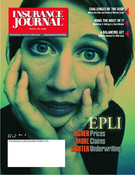As promised, the 78th Texas Legislature is on a roll with insurance reform, with one bill having been signed into law and many more in committees or on their way to the House and Senate floors. Among the proposed legislation making the most headlines are bills requiring insurers to file rate data, those calling for rate rollbacks in the homeowners insurance market and proposals dealing with tort reform.
The first insurance bill of the session, Senate Bill 310, was signed by Gov. Rick Perry in late February and Texas Insurance Commissioner Jose Montemayor wasted no time in issuing an order to insurance companies to comply with the new legislation. The bill, co-sponsored by Sen. Troy Fraser, R-Horseshoe Bay, and Rep. John Smithee, R-Amarillo, requires residential property insurers to file rates and supporting information—including current rates and estimated rates to be charged over the next six months—with the Texas Department of Insurance. It moved quickly through both the Senate and House and onto Perry’s desk.
The information will be compiled by the Texas Department of Insurance and used in a report to be generated by Montemayor for submission to the Texas Legislature within approximately 30 days of the order. The report will regard insurer data as proprietary, and insurers were generally in favor of the bill.
Insurers with a five percent or greater share of the residential property insurance market in Texas must file the rating information. In addition, some insurers with a less than five percent share will be required to file if the commissioner determines the need for it. Failure to comply with SB 310 may subject insurers to administrative penalties and fines.
Lawmakers are hoping the bill will be the first step in lowering homeowners rates, which was high on the list of many campaign promises made in advance of last November’s statewide elections. Fraser has said he hopes the data will show that rates are too high and a rollback is in order. At the bill signing, Fraser applauded “Gov. Perry for his leadership by putting insurance legislation on the fast track.” He added that the “governor’s signature on Senate Bill 310 represents the first step in bringing about insurance reform because it requires insurance companies to open their books and show us whether consumers are being treated fairly.”
“Texans will judge whether our efforts are successful by one standard: whether we lower their rates,” Perry said. “And I won’t be satisfied until Texas homeowners get the rate relief they demand and deserve.”
Rolling back rates
Bills that relate directly to rate rollbacks include SB 400 and its companion, House Bill 600. The Senate Committee on Business and Commerce has heard invited testimony on SB 400, which would require insurance companies to roll homeowners rates back to the levels that were in effect on Jan. 1, 2001. Under the bill, proposed by San Antonio Sen. Leticia Van de Putte, insurers’ rates would have to be approved by the commissioner of insurance, and insurance companies would be required to disclose underwriting guidelines. It also authorizes the TDI to adopt and approve insurance rating manuals. In addition, SB 400 and HB 600 would prohibit the use of credit scoring for both underwriting and rating.
Sen. Van de Putte said SB 400 will put the burden of proof on the insurance companies to prove that their rates are not excessive and will ensure that insurer’s rating practices no longer remain secret. She commented that the bill will give homeowners deserved relief and will provide them an average refund of $436.
HB 600, was introduced by Rep. Steve Wolens of Dallas. Filing the bill in late January, Wolens expressed doubt that his bill would find any support among insurers.
“Today I’m filing HB 600—comprehensive insurance reform legislation—designed to protect Texas families, not insurance companies,” Wolens said. “The Insurance Reform and Consumer Protection Act will roll back insurance rates, implement a prior approval process, make insurance information public, prohibit credit scoring, and assure that companies don’t just stick with us in good times.
“Texas is first in the nation where we should be last. We lead the nation with an average homeowners premium that is almost double the national average. This is simply unacceptable. The people of Texas are rightfully angry about their homeowners premiums. They won’t tolerate the current situation, and neither will I,” Wolens said.
According to Wolens, HB 600 is supported by AARP, Consumers Union, Texas Watch, LULAC, MALDEF, Texas PIRG, and Common Cause.
“The Insurance Reform and Consumer Protection Act may not get the blessing of the insurance industry,” Wolens concluded. “But I don’t need to tell most Texans that we are in a crisis. Texas has the highest homeowners insurance rates in the country, brought on by insurance companies exploiting loopholes. My goal is to close loopholes and assure Texans that they will be protected from rate increases, unfair underwriting, and the insurance industry calling the shots in Texas.”
HB 600, like SB 400 eliminates certain regulatory exemptions that currently apply to county mutual, Lloyd’s plan, and reciprocal exchanges. According to the House fiscal analysis, it would also require insurers planning to reduce their premium volume in the state by 50 percent or more to file a withdrawal plan with TDI. The current reduction threshold is 75 percent. In addition, any insurer that withdraws from either private passenger auto or residential property insurance would be prohibited from writing any insurance line in the state for five years, unless otherwise approved by the commissioner.
Wolens was correct in his assessment that HB 600 would find little support within the insurance industry. Immediately after the bill’s filing, the Southwestern Insurance Information Service (SIIS), an industry trade group, came out with a statement calling the bill a “disaster.” The SIIA said that the bill’s intentions may be good, but in reality such legislation would lead to “a malfunctioning insurance climate … and make Texas a vast wasteland for those seeking to purchase financial security.”
In the statement, SIIS president Jerry Johns commented, “At a time when reasonable minds seem to be prevailing and our elected officials appear focused on fixing the insurance market the right way, along comes legislation which would move the insurance climate for consumers back 20 years.
“We need only to look at New Jersey where some of the most restrictive insurance regulation in the country exists and even the best drivers in the state find it a challenge to buy insurance,” he added. “If a blanket of regulation, where people have no options in what insurance coverage they purchase and insurers flee the market is the intention, then HB 600 will have achieved its purpose.”
Both HB 600 and SB 400 were scheduled for further hearings in early March.
Tackling lawsuit abuse
House Civil Practices Committee Chairman Joe Nixon of Houston is taking aim at lawsuit abuse through two bills, HB 3, which specifically targets medical lawsuit abuse and HB 4, a bill that would implement comprehensive reforms to curb lawsuit abuse in the state in general. Calling them “two of the legislative session’s most high-profile bills,” the Austin-American Statesman reported that Nixon plans to combine the two in order to enable legislators to address tort reform more efficiently.
In filing HB 3, Nixon outlined the three-fold objectives of the proposed legislation: “(1) To ensure just and full compensation for all Texans who have valid medical liability claims, including 100-percent recovery for all past/present/future medical expenses and all past/present/ future lost earnings. (2) To ensure access to medical care for all Texans … by making health care liability premiums available and affordable for Texas health care providers. (3) To stop the current frivolous medical liability ‘Texas lawsuit lottery’ with a $250,000 cap on non-economic damage awards; necessary procedural reforms; and a limitation on unreasonable lawyer contingency fees.”
According to Nixon, HB 4, the general tort reform bill, provides incentives to settle lawsuits early, allows juries to hear pertinent information, assigns more equitable apportionment of fault to responsible parties, would prevent forum-shopping, and addresses product liability reform, among other things.
Nixon said HB 4 was needed because despite improvements to the Texas civil justice system enacted by the legislature in 1995, “continued lawsuit abuses have shown that a lot of work remains to be done. The legislation I filed today represents the comprehensive effort required to assure that Texas courts are first and foremost an impartial venue for resolving legitimate disputes for Texas residents.”
He indicated that merging the two bills could put the proposed legislation on a fast track to the governor’s desk, since Gov. Perry has designated medical malpractice an emergency issue for the legislature.
However, some remain skeptical about Nixon’s plan merge the two lawsuit reform bills. Rep. Steve Wolens likened the merger to a “marriage between two people who have never met.” He told the Statesman that bringing the two bills together would not be good for doctors, the medical profession or the state of Texas.
Dan Lambe, executive director of Texas Watch, a consumer lobby, expressed doubt that doctors would want the medical malpractice issue to put in a package with a general tort reform bill.
Topics Lawsuits Texas Carriers Legislation Homeowners Market
Was this article valuable?
Here are more articles you may enjoy.


 Zurich Insurance’s Beazley Bid Sets the Stage for More Insurance Deals
Zurich Insurance’s Beazley Bid Sets the Stage for More Insurance Deals  Chubb CEO Greenberg on Personal Insurance Affordability and Data Centers
Chubb CEO Greenberg on Personal Insurance Affordability and Data Centers  Howden-Driven Talent War Has Cost Brown & Brown $23M in Revenue, CEO Says
Howden-Driven Talent War Has Cost Brown & Brown $23M in Revenue, CEO Says  GEICO Settles Call-Center Worker Suits for $940,000; Attorneys Get Half
GEICO Settles Call-Center Worker Suits for $940,000; Attorneys Get Half 


